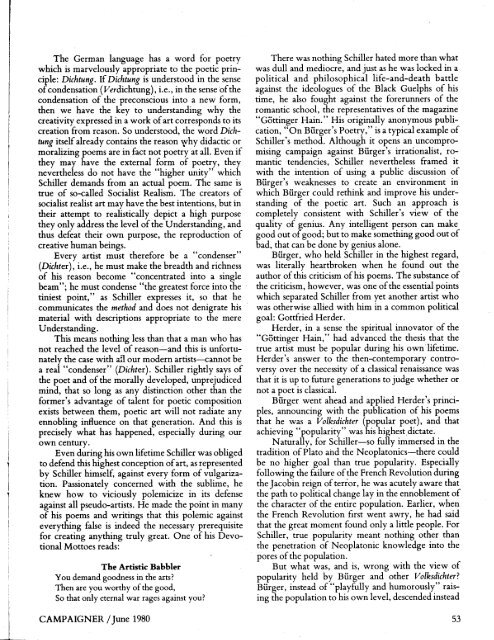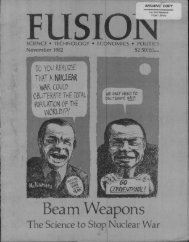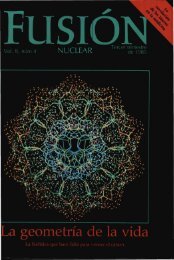Campaigner
Campaigner
Campaigner
Create successful ePaper yourself
Turn your PDF publications into a flip-book with our unique Google optimized e-Paper software.
{ CAMPAIGNER/June 1980 53<br />
_l<br />
The German language has a word for poetry There was nothing Schiller hated more than what<br />
which is marvelously appropriate to the poetic prin- was dull and mediocre, and just as he was locked in a<br />
ciple: Dichtung. IfDichtung is understood in the sense political and philosophical life-and-death battle<br />
of condensation (Verdichtung), i.e., in the senseofthe against the ideologues of the Black Guelphs of his<br />
condensation of the preconscious into a new form, time, he also fought against the forerunners of the<br />
then we have the key to understanding why the romantic school, the representatives of the magazine<br />
creativity expressed in a work of art corresponds to its "GSttinger Hain." His originally anonymous publicreation<br />
from reason. So understood, the word Dich- cation, "On B[irger's Poetry," is a typical example of<br />
tung itself already contains the reason why didactic or Schiller's method. Although it opens an uncompromoralizing<br />
poems are in fact not poetry at all. Even if mising campaign against Biirger's irrationalist, tothey<br />
may have the external form of poetry, they mantic tendencies, Schiller nevertheless framed it<br />
nevertheless do not have the "higher unity" which with the intention of using a public discussion of<br />
Schiller demands from an actual poem. The same is Biirger's weaknesses to create an environment in<br />
true of so-called Socialist Realism. The creators of which Biirger could rethink and improve his undersocialist<br />
realist art may have the best intentions, but in standing of the poetic art. Such an approach is<br />
their attempt to realistically depict a high purpose completely consistent with Schiller's view of the<br />
they only address the level of the Understanding, and quality of genius. Any intelligent person can make<br />
thus defeat their own purpose, the reproduction of good out of good; but to make something good out of<br />
creative human beings,<br />
bad, that can be done by genius alone.<br />
Every artist must therefore be a "condenser" B[irger, who held Schiller in the highest regard,<br />
(Dichter), i.e., he must make the breadth and richness was literally heartbroken when he found out the<br />
of his reason become "concentrated into a single author of this criticism of his poems. The substance of<br />
beam"; he must condense "the greatest force into the the criticism, however, was one of the essential points<br />
tiniest point," as Schiller expresses it, so that he which separated Schiller from yet another artist who<br />
communicates the method and does not denigrate his was otherwise allied with him in a common political<br />
material with descriptions appropriate to the mere goal: Gottfried Herder.<br />
Understanding. Herder, in a sense the spiritual innovator of the<br />
This means nothing less than that a man who has "GSttinger Hain," had advanced the thesis that the<br />
not reached the level of reasonmand this is unfortu- true artist must be popular during his own lifetime.<br />
nately the case with all our modern artists cannot be Herder's answer to the then-contemporary controa<br />
real "condenser" (Dichter). Schiller rightly says of versy over the necessity of a classical renaissance was<br />
the poet and of the morally developed, unprejudiced that it is up to future generations to judge whether or<br />
mind, that so long as any distinction other than the not a poet is classical.<br />
former's advantage of talent for poetic composition Biirger went ahead and applied Herder's princiexists<br />
between them, poetic art will not radiate any pies, announcing with the publication of his poems<br />
ennobling influence on that generation. And this is that he was a Volksdichter (popular poet), and that<br />
precisely what has happened, especially during our achieving "popularity" was his highestdictate.<br />
own century. Naturally, for Schiller so fully immersed in the<br />
Even during his own lifetime Schiller was obliged tradition of Plato and the Neoplatonics--there could<br />
to defend this highest conception of art, as represented be no higher goal than true popularity. Especially<br />
by Schiller himself, against every form of vulgariza- following the failure of the French Revolution during<br />
tion. Passionately concerned with the sublime, he the Jacobin reign of terror, he was acutely aware that<br />
knew how to viciously polemicize in its defense the path to political change lay in the ennoblement of<br />
against all pseudo-artists. He made the point in many the character of the entire population. Earlier, when<br />
of his poems and writings that this polemic against the French Revolution first went awry, he had said<br />
everything false is indeed the necessary prerequisite that the great moment found only a little people. For<br />
for creating anything truly great. One of his Devo- Schiller, true popularity meant nothing other than<br />
tional Mottoes reads: the penetration of Neoplatonic knowledge into the<br />
pores of the population.<br />
The Artistic Babbler But what was, and is, wrong with the view of<br />
You demand goodness in the arts? popularity held by Biirger and other Volksdichter?<br />
Then are you worthy of the good, Biirger, instead of "playfully and humorously" rais-<br />
So that only eternal war rages against you? ing the population to his own level, descended instead

















